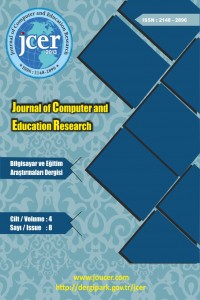Abstract
Technology has provoked the concept of game to
be viewed from different perspectives by generations. The most careful
observers of these are the most adapted ones, which are students. This research
study aims to find the similarities and differences of video game playing
preferences of 3 Generations from the students’ eye. The study sample consists
of 50 students from whom data was collected. Univariate one-way Anova is used
to compare group means of Game Genre groups (“Building”, “Cars”, “Cards”,
“Cartoon”, “Educational”, “Simulation”, “Spor”, “Strategy” and “War”), which
are formed by metaphorical analysis of students’ narratives. Independent sample
t-test is used to find if there is a significant difference between girls and
boys game genre playing preferences. This paper is orientated towards anyone
interested in video games; especially game designers, teachers, instructors,
students and educational organizations, such as primary.
Keywords
References
- Aguilera, M. & Mendiz, A. (2003). Video games and education, (Education in the face of a "parallel school"), Computers in Entertainment, 1 (1).
- Bilgihan, A. Cobanoglu, C. Nusair, Okumus, F. & Bujisic. M. (2013). A quantitative study exploring the difference between gaming genre Playing Preferences, The Computer Games Journal, 2(1).
- Brunborg. G.S., Mentzoni, R., A., Frøyland, L., R. (2014). Is video gaming or video game addiction associated with depression academic achievement heavy episodic drinking or conduct problems? Journal of Behavioral Addictions, 3(1), 27–32.
- Chiu. S., Lee. J., & Huang, D. (2004). Video game addiction in children and teenagers in Taiwan, Cyber Psychology & Behavior, 7, 571-581.
- Dobrowolski, P., Hanusz, K., Sobczyk. B., Skorko. M. & Wiatrow. A. (2015). Cognitive enhancement in video game players, The role of video game genre, Computers in Human Behavior, (44), 59-63.
- Doh. Y.Y. & Whang, S-M., L. (2014). From Separation to Integration Identity Development of Korean Adult Players in Online Game World, Games and Culture, 9 (1), 130-157.
- Greenberg. B. S., Sherry. J., Lachlan. K., Lucas. K., & Holmstrom. A. (2010). Orientations to video games among gender and age groups, Stimulation & Gaming, 41(2), 238-259.
- Griffiths M. D., Kuss D. J. & King D. L. (2012). Video game addiction, Past, present, future, Current Psychiatry Reviews, 8,308–318.
- Hauge, M. R., & Gentile, D. A. (2003). Video game addiction among adolescents, Associations with academic performance and aggression. Paper presented at Society for Research in Child Development Conference, Tampa. FL.
- Holtz P. & Appel M. (2011). Internet use and video gaming predict problem behavior in early adolescence, Journal of Adolescence, 34, 49–58.
Abstract
Technology has provoked the concept of game to
be viewed from different perspectives by generations. The most careful
observers of these are the most adapted ones, which are students. This research
study aims to find the similarities and differences of video game playing
preferences of 3 Generations from the students’ eye. The study sample consists
of 50 students from whom data was collected. Univariate one-way Anova is used
to compare group means of Game Genre groups (“Building”, “Cars”, “Cards”,
“Cartoon”, “Educational”, “Simulation”, “Spor”, “Strategy” and “War”), which
are formed by metaphorical analysis of students’ narratives. Independent sample
t-test is used to find if there is a significant difference between girls and
boys game genre playing preferences. This paper is orientated towards anyone
interested in video games; especially game designers, teachers, instructors,
students and educational organizations, such as primary.
Keywords
References
- Aguilera, M. & Mendiz, A. (2003). Video games and education, (Education in the face of a "parallel school"), Computers in Entertainment, 1 (1).
- Bilgihan, A. Cobanoglu, C. Nusair, Okumus, F. & Bujisic. M. (2013). A quantitative study exploring the difference between gaming genre Playing Preferences, The Computer Games Journal, 2(1).
- Brunborg. G.S., Mentzoni, R., A., Frøyland, L., R. (2014). Is video gaming or video game addiction associated with depression academic achievement heavy episodic drinking or conduct problems? Journal of Behavioral Addictions, 3(1), 27–32.
- Chiu. S., Lee. J., & Huang, D. (2004). Video game addiction in children and teenagers in Taiwan, Cyber Psychology & Behavior, 7, 571-581.
- Dobrowolski, P., Hanusz, K., Sobczyk. B., Skorko. M. & Wiatrow. A. (2015). Cognitive enhancement in video game players, The role of video game genre, Computers in Human Behavior, (44), 59-63.
- Doh. Y.Y. & Whang, S-M., L. (2014). From Separation to Integration Identity Development of Korean Adult Players in Online Game World, Games and Culture, 9 (1), 130-157.
- Greenberg. B. S., Sherry. J., Lachlan. K., Lucas. K., & Holmstrom. A. (2010). Orientations to video games among gender and age groups, Stimulation & Gaming, 41(2), 238-259.
- Griffiths M. D., Kuss D. J. & King D. L. (2012). Video game addiction, Past, present, future, Current Psychiatry Reviews, 8,308–318.
- Hauge, M. R., & Gentile, D. A. (2003). Video game addiction among adolescents, Associations with academic performance and aggression. Paper presented at Society for Research in Child Development Conference, Tampa. FL.
- Holtz P. & Appel M. (2011). Internet use and video gaming predict problem behavior in early adolescence, Journal of Adolescence, 34, 49–58.
Details
| Journal Section | Research Article |
|---|---|
| Authors | |
| Publication Date | December 29, 2016 |
| Submission Date | January 22, 2016 |
| Acceptance Date | August 10, 2016 |
| Published in Issue | Year 2016 Volume: 4 Issue: 8 |
This work is licensed under a Creative Commons Attribution 4.0 International License.
Dear Authors;
We would like to inform you that ORCID, which includes 16 digit number will be requested from the authors for the studies to be published in JCER. It is important to be
sensitive on this issue.
Best regards...



